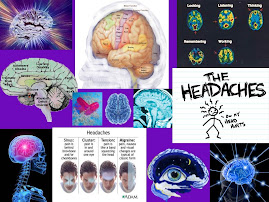Subscribe to:
Post Comments (Atom)
skip to main |
skip to sidebar

Collage

Key Terms
- Abortive Treatment – medicine taken once a migraine begins to stop it
- Aura – a warning that a migraine is coming, such as blurred vision or seeing spots
- Cluster Headaches - severe groups of headaches that can last for weeks; 90% occur in men; may cause red, teary eyes, a runny nose, or nausea
- Headache - episodes of pain that can occur above the eyes or ear, in the back of the head, or in the upper neck area
- Migraine - throbbing or pulsating headache; usually on only one side of the head; associated with symptoms such as sensitivity to light and nausea; migraines are often recurrent
- Neuroscience - the study of the nervous system
- Prophylactic Treatment – treatment taken daily to help prevent and control migraines
- Rebound Headache - a drug-induced headache that can develop over time by creating a tolerance to a certain medication you take often
- Sinus Headache - headaches related to your nasal passages; pain in the forehead, cheeks, or bridge of the nose
- Tension headaches – most common headache; can be caused by: stress, mental or physical fatigue, foods, caffeine withdrawal, or eye strain
Project Links
- Caffeine and Headaches: What You Need to Know
- Class Blog
- Headache Treatment Options
- Headache: Treatment Options
- Headaches and Migraines Center
- Headaches KidsHealth
- Kids' headaches are cause for concern
- Migraine Headaches
- Migraine Headaches
- Migraine Headaches, Allergies
- Migraine Headaches, Vision Effects
- Society for Neuroscience
- St. Luke's Center for Neurosciences and Headaches
About Me
- Alyssa
- The Medical Explorers is a part of the University of Pittsburgh Medical School and is coordinated by Dr. Robert Connamacher. Meetings are currently taking place Wednesday evenings at Scaife Hall, which is located in Scaife Hall, across from the Peterson Event Center. Meetings begin at 6:00 p.m. (don't be late!) and usually end around 7:30 p.m. The program allows students interested in medicine, especially those in high school, to learn about medical topics with experts and hands-on activities. There are also other activities, such as being able to see corpses and organs in the labs, and taking trips to places such as the UPMC Dental School.
No comments:
Post a Comment